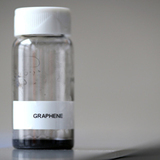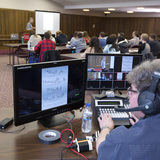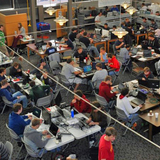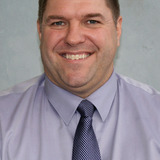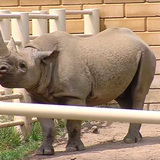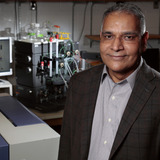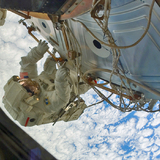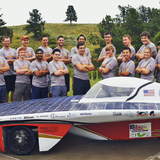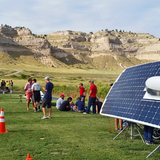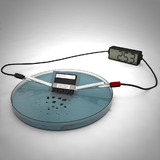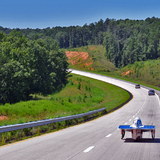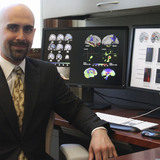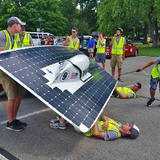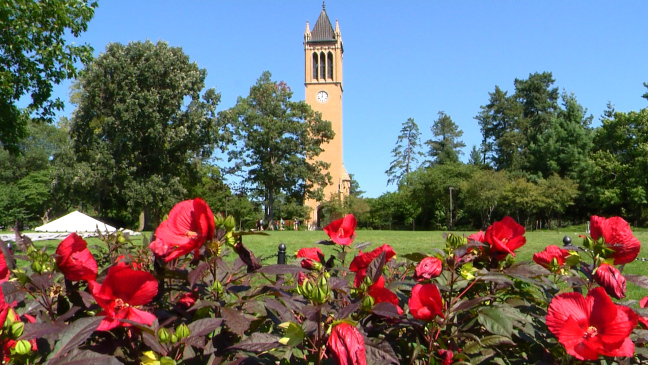News Archive
Friday, September 2 2016
-
Iowa State engineers treat printed graphene with lasers to enable paper electronics, devices
Iowa State engineers have led development of a laser-treatment process that allows them to use printed graphene for electric circuits and electrodes -- even on paper and other fragile surfaces. The technology could lead to many real-world, low-cost applications for printed graphene electronics, including sensors, fuel cells and medical devices. The engineers describe their process in the journal Nanoscale.
-
C-SPAN back-to-school week features Hohmann’s modern road design lecture Friday
"From Parkways to Freeways: Modern Road Design," a lecture presented by Landscape Architecture Associate Professor Heidi Hohmann, will debut at 7 p.m. Friday, Sept. 2, on C-SPAN 3 as part of the network's American History TV back-to-school week. It will re-air at 10:45 p.m., and in October.
-
Iowa State cyber-security playground named finalist for R&D 100 Award
A cyber-security playground developed at Iowa State is one of the finalists for this year's R&D 100 Awards, dubbed the "Oscars of invention." The ISERink technology can be used for cyber defense competitions, university classes, research projects and industry training. The software is available to other universities, colleges, community colleges and government agencies for free.
-
Michael Fosberg will present autobiographical one-man play on race and identity Sept. 8
Michael Fosberg grew up in a working class family thinking he was white. After all, his biological mother was white. His adoptive father was white. But at the age of 34, he learned his biological father was a black man. This life-changing event led to a remarkable journey of self discovery. Fosberg will present his autobiographical, one-man play at 7 p.m. Thursday, Sept. 8, in the Memorial Union Great Hall. His unique presentation, "Incognito: On Race, Identity and Self Discovery," will be followed by a discussion about the meaning of race and identity and the importance of embracing diversity.
-
Cases of Senecavirus A at pork processing plants underscore importance of vigilance, according to Iowa State University veterinarian
Cases of Senecavirus A confirmed at a pair of Iowa pork processing plants should remind producers to remain on the lookout for vesicles, or blisters, on their pigs, according to an Iowa State University veterinarian.
-
For ISU veterinarian and vet students, an endangered black rhino’s pregnancy is a (very) big deal
An Iowa State University veterinarian looks ahead to the first ever rhino birth at Blank Park Zoo in Des Moines.
-
Iowa State physicists win W.M. Keck Foundation grant to develop nanoscope
Iowa State's Jigang Wang is leading an effort to develop a new kind of microscope called a "nanoscope." The new tool will allow researchers to study materials at scales that are ultrafast, ultrasmall and at very low frequencies. That could help researchers discover and manipulate materials and material functions. The W.M. Keck Foundation of Los Angeles is supporting the project with a three-year, $1.3 million grant.
-
Iowa State University scientists locate possible therapy target for spinal muscular atrophy
Alu elements, or short stretches of DNA found only in primates, may hold the key to a potential new therapy for spinal muscular atrophy, according to new ISU research.
-
Astronaut Clayton Anderson set to help students understand ‘operational thinking’
Astronaut Clayton Anderson is helping organize and teach the third Spaceflight Operations Workshop at Iowa State University. By using astronaut-training exercises such as scuba lessons, teambuilding activities, flight simulations and skydiving, Anderson hopes the workshop will teach 12 students to think operationally. He says that's a necessity for engineers designing spacesuits -- and for engineers designing tractors, bulldozers or passenger cars.
-
Team PrISUm finishes nearly 2,000 miles of racing in seventh, wins two achievement awards
Team PrISUm finished an up-and-down American Solar Challenge in seventh place. Judges recognized the team for overcoming adversity and for making the best of a failed brake test. The team also won two big achievement awards. And, there were countless lessons learned on the long road from Ohio to South Dakota.
-
Cloud cover slows Team PrISUm, team has to haul Phaëton 2 to Scotts Bluff
Team PrISUm -- as did some of its competitors -- struggled to make speed and distance under Nebraska's cloudy skies on Friday. The team made it more than halfway to the day's stage stop, but was at risk of draining Phaëton 2's battery pack. So the team's students loaded up the car and hauled it the rest of the way. The eight-day race ends Saturday at Wind Cave National Park in South Dakota.
-
Team PrISUm aces a 280-mile race day; faces a 330-mile test on Friday
The student-engineers of Team PrISUm are no longer racing for a top finish in the American Solar Challenge. Now the race is all about testing components and systems for their next solar car -- and their dream of racing in the October 2017 World Solar Challenge across Australia.
-
Iowa State scientists develop self-destructing battery to power ‘transient’ devices
Reza Montazami and his research group have developed a working battery that self-destructs in water. It's part of a field of study called "transient electronics." Montazami said the battery project presented many challenges, including a complex structure and difficulties in fabrication. The team's findings were recently published in a polymer physics journal.
-
Team PrISUm enjoys sunny skies and a (mostly) quiet drive to Topeka
Team PrISUm had a good day of solar racing into Topeka, Kansas. The team had few problems and kept even with Minnesota, Illinois State and two teams from Canada. Next is a drive up to Nebraska, but thunderstorms could cause problems for the teams.
-
ISU study suggests ‘use it or lose it’ to defend against memory loss
Iowa State University researchers have identified a protein essential for building memories that appears to predict the progression of memory loss and brain atrophy in Alzheimer’s patients. Their findings suggest there is a link between brain activity and the presence of this protein.
-
Team PrISUm races nearly 300 miles on the day, runs out of charge 5 miles from stage stop
Team PrISUm ran through every calculation and strategy, but couldn't quite make the battery power last all the way to the second stage stop of this year's American Solar Challenge. So now the team's student-engineers will do all they can to pack their battery pack with sun power. They'll need it -- the race's longest stage starts on Wednesday.
